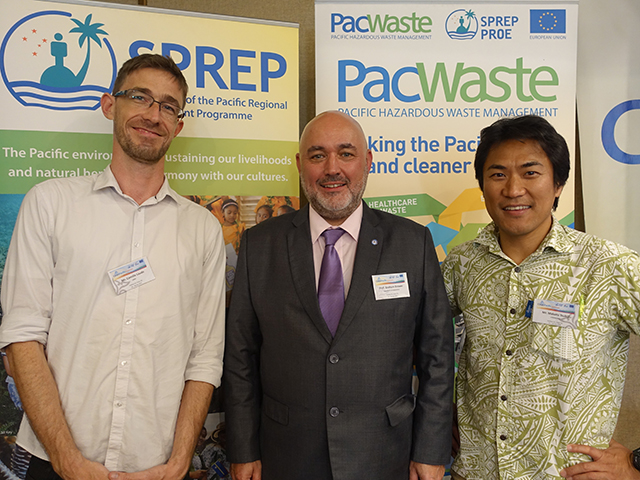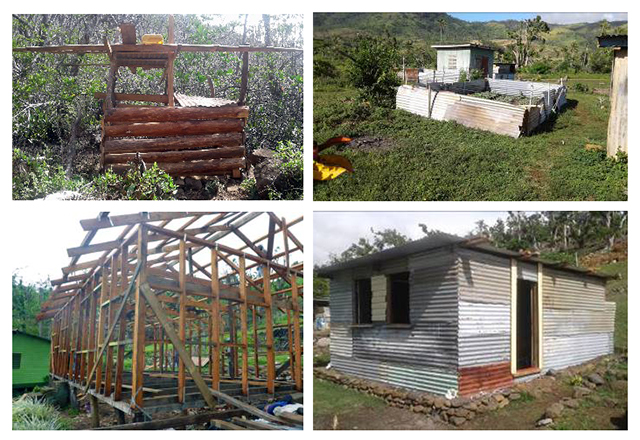
Waste Management and Pollution Control
27 July, 2016 – Suva, Fiji: The critical importance of managing the vast quantity of waste caused by cyclones, flooding and tsunamis was highlighted at a special side event of the inaugural Clean Pacific Roundtable in Suva.
With natural disasters in the Pacific region increasing in frequency and severity, the issue of disaster waste has developed a higher profile and greater sense of urgency. Natural disasters generate a huge volume of intermingled waste types - comprising solid, green and hazardous waste - which often need to be cleared very quickly to allow for relief efforts to be undertaken.
The side event, held on 25 July 2016, brought together a panel of technical experts to discuss the issue of disaster waste management in a Pacific context. Sponsored by the Japan international Cooperation Agency (JICA) and facilitated by Ms Akiko Fujii (Deputy Resident Representative, UNDP Pacific Office) the special event provided a forum to share lessons learned from previous disaster waste management interventions.
The event was opened by Mr Shiro Amano, former Chief Advisor for the Japanese Technical Cooperation Project for Promotion of Regional Initiative on Solid Waste Management in Pacific Island Countries (J-PRISM) Project.

In his opening remarks, Mr Amano emphasised the importance of establishing a regional framework on disaster waste management to encourage the formation of mechanisms to support the coordination of disaster waste management.
"Within the last five years, the Pacific region has been affected by several natural disasters that resulted in disaster waste. While considerable efforts have been focused on predicting and building resilience to climate change-related disaster impacts in the Pacific, the regional/national management of debris and waste after each disaster event is an area that requires attention – both in terms of preparedness and response."
In his presentation to the meeting, Mr Camille Laude (Technical Adviser for Disaster Waste Management, UNDP Pacific Office), noted that the increasing impact of a natural disaster can be avoided through the proper and timely management of disaster waste:
"Common practices such as the burning of waste and debris following a disaster can cause the release of damaging chemicals. Similarly, burying unsorted debris or disposing of it into oceans and waterways can have a harmful effort on human and environmental health, as can the unprotected handling of hazardous waste. A key lesson we have learned is the need to act quickly as most negative practices, such as burning and improper waste disposal, happen during first weeks following a disaster."
By contrast, Mr Laude explained, targeted assistance in disaster waste management can empower affected communities to accelerate the recovery process through the use of disaster debris.

Another essential approach, learned from experience, is the need for assessment tools, intervention strategies and coordination mechanisms to be defined prior to a natural disaster.
This sentiment was echoed by Mr Faafetai Sagapolutele, Assistant Chief Advisor for the J-PRISM Project Team, who stressed the importance of disaster waste management in preventing the escalation of hardship for affected communities:
"While the provision of recovery works on road, electricity and water is vital, it must also be remembered that delaying the management of disaster waste can create another disaster for affected communities because of people's exposure to contaminated water, sharp items, bad smells and hazardous materials."
Also speaking at the event were Ms Alison Burchell (Permanent Secretary, Ministry of Youth and Sports, Fiji) and Dr Graham Brewer (Executive Director of UNITAR's Centre for Disaster Risk Reduction, University of Newcastle).
Ms Burchell outlined some of the lessons learned, from a community resilience perspective, as a result of recovery efforts in the cyclone devastated area of Koro in Fiji.
Dr Brewer discussed capacity-building modalities for Pacific Small Island Developing States, with particular reference to the accredited courses in Disaster Risk Reduction offered by UNITAR's Centre for Disaster Risk Reduction at the University of Newcastle in Australia.
The event prompted energetic discussion from participants at the Roundtable, with many Pacific island nation representatives stressing the importance of integrating disaster waste management into national disaster management plans.
The inaugural Clean Pacific Roundtable is being held from 25 - 28 July 2016 at the Holiday Inn, Suva, The Clean Pacific Roundtable is coordinated by the Secretariat of the Pacific Regional Environment Programme (SPREP) with the generous support of JICA and the European Union. For further information, please visit: https://www.sprep.org/clean-pacific-roundtable
With natural disasters in the Pacific region increasing in frequency and severity, the issue of disaster waste has developed a higher profile and greater sense of urgency. Natural disasters generate a huge volume of intermingled waste types - comprising solid, green and hazardous waste - which often need to be cleared very quickly to allow for relief efforts to be undertaken.
The side event, held on 25 July 2016, brought together a panel of technical experts to discuss the issue of disaster waste management in a Pacific context. Sponsored by the Japan international Cooperation Agency (JICA) and facilitated by Ms Akiko Fujii (Deputy Resident Representative, UNDP Pacific Office) the special event provided a forum to share lessons learned from previous disaster waste management interventions.
The event was opened by Mr Shiro Amano, former Chief Advisor for the Japanese Technical Cooperation Project for Promotion of Regional Initiative on Solid Waste Management in Pacific Island Countries (J-PRISM) Project.

Pictured above: Mr Camille Laude (UNDP), Mr Makoto Tsukiji (J-PRISM) and Dr Graham Brewer (University of Newcastle) at the Clean Pacific Roundtable in Suva, Fiji. Photo: A.Carvan/SPREP.
In his opening remarks, Mr Amano emphasised the importance of establishing a regional framework on disaster waste management to encourage the formation of mechanisms to support the coordination of disaster waste management.
"Within the last five years, the Pacific region has been affected by several natural disasters that resulted in disaster waste. While considerable efforts have been focused on predicting and building resilience to climate change-related disaster impacts in the Pacific, the regional/national management of debris and waste after each disaster event is an area that requires attention – both in terms of preparedness and response."
In his presentation to the meeting, Mr Camille Laude (Technical Adviser for Disaster Waste Management, UNDP Pacific Office), noted that the increasing impact of a natural disaster can be avoided through the proper and timely management of disaster waste:
"Common practices such as the burning of waste and debris following a disaster can cause the release of damaging chemicals. Similarly, burying unsorted debris or disposing of it into oceans and waterways can have a harmful effort on human and environmental health, as can the unprotected handling of hazardous waste. A key lesson we have learned is the need to act quickly as most negative practices, such as burning and improper waste disposal, happen during first weeks following a disaster."
By contrast, Mr Laude explained, targeted assistance in disaster waste management can empower affected communities to accelerate the recovery process through the use of disaster debris.

Some examples of the re-use of debris for recovery in Ra Province, Fiji. Pictured (clockwise from top left) a pig pen, home garden, house frame and tool shed constructed of recovered materials. Photos: © Kanito Matagasau and Camille Laude/UNDP.
Another essential approach, learned from experience, is the need for assessment tools, intervention strategies and coordination mechanisms to be defined prior to a natural disaster.
This sentiment was echoed by Mr Faafetai Sagapolutele, Assistant Chief Advisor for the J-PRISM Project Team, who stressed the importance of disaster waste management in preventing the escalation of hardship for affected communities:
"While the provision of recovery works on road, electricity and water is vital, it must also be remembered that delaying the management of disaster waste can create another disaster for affected communities because of people's exposure to contaminated water, sharp items, bad smells and hazardous materials."
Also speaking at the event were Ms Alison Burchell (Permanent Secretary, Ministry of Youth and Sports, Fiji) and Dr Graham Brewer (Executive Director of UNITAR's Centre for Disaster Risk Reduction, University of Newcastle).
Ms Burchell outlined some of the lessons learned, from a community resilience perspective, as a result of recovery efforts in the cyclone devastated area of Koro in Fiji.
Dr Brewer discussed capacity-building modalities for Pacific Small Island Developing States, with particular reference to the accredited courses in Disaster Risk Reduction offered by UNITAR's Centre for Disaster Risk Reduction at the University of Newcastle in Australia.
The event prompted energetic discussion from participants at the Roundtable, with many Pacific island nation representatives stressing the importance of integrating disaster waste management into national disaster management plans.
The inaugural Clean Pacific Roundtable is being held from 25 - 28 July 2016 at the Holiday Inn, Suva, The Clean Pacific Roundtable is coordinated by the Secretariat of the Pacific Regional Environment Programme (SPREP) with the generous support of JICA and the European Union. For further information, please visit: https://www.sprep.org/clean-pacific-roundtable